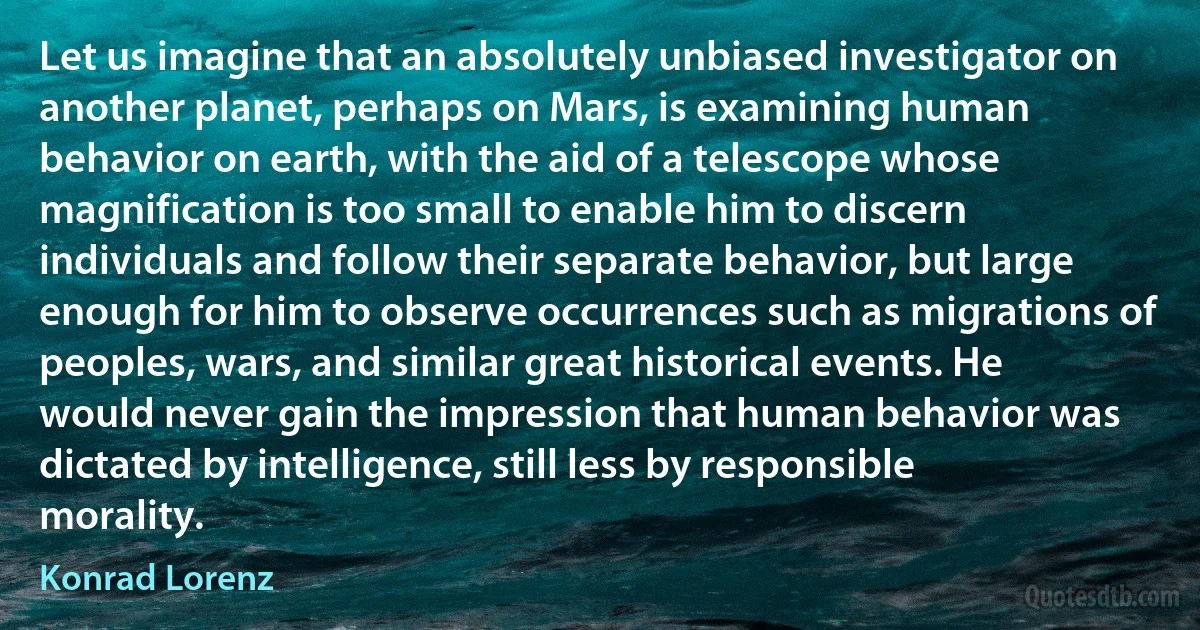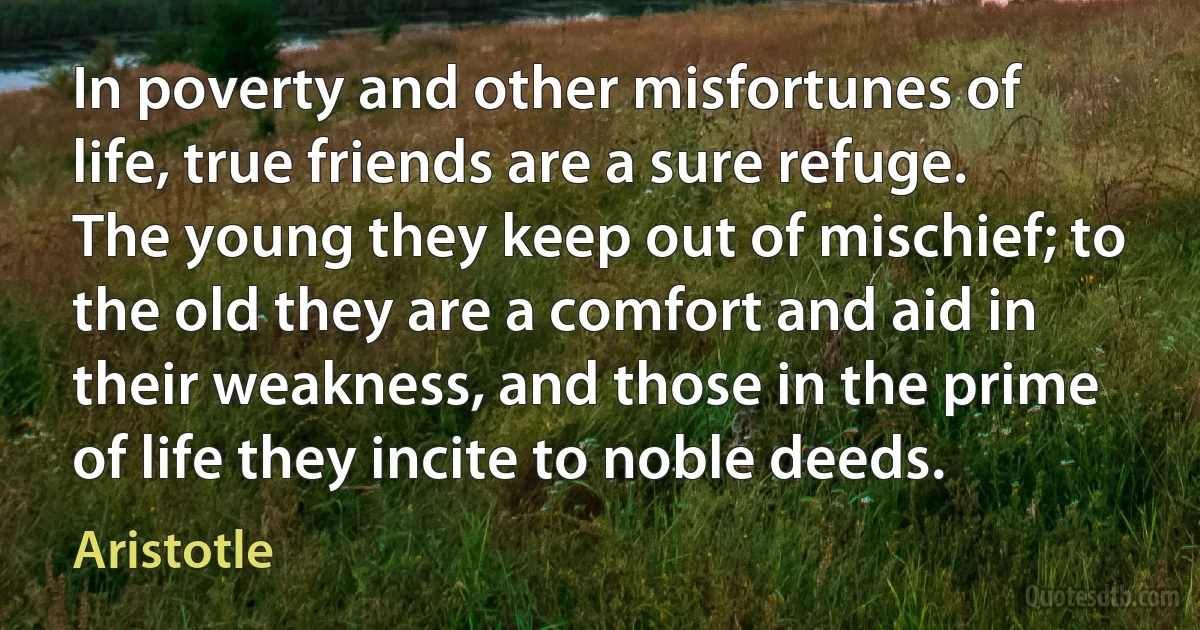Aid Quotes - page 14
Even bold and revolutionary thinkers bow to the judgment of science. Kropotkin wants to break up all existing institutions, but he does not touch science. Ibsen goes very far in his critique of bourgeois society, but he retains science as a measure of truth. Levi Strauss has made us realize that Western thought is not the lonely peak of human achievement it was once thought to be, but he and his followers exclude science from their relativization of ideologies. Marx and Engels were convinced that science would aid the workers in their quest for mental and social liberation.

Paul Karl Feyerabend
'And victory the beautiful woman (shahid) whose world-adornment of waving tresses was embellished by Allah will aid you with a mighty aid, bestowed on us the good fortune that had been hidden behind a veil, and made it a reality. The absurd (batil) Hindus, knowing their position perilous, dispersed like carded wool before the wind, and like moths scattered abroad. Many fell dead on the field of battle; others, desisting from fighting, fled to the desert exile and became the food of crows and kites. Mounds were made of the bodies of the slain, pillars of their heads.

Babur
The brave and clear platform adopted by this convention, to which I heartily subscribe, sets forth that government in a modern civilization has certain inescapable obligations to its citizens, among which are protection of the family and the home, the establishment of a democracy of opportunity, and aid to those overtaken by disaster.

Franklin D. Roosevelt
Although what is called ‘philosophical speculation' is undoubtedly on the decline, many of the practically minded have not yet freed themselves from a method of reasoning, which, in the last analysis, has its roots in theology and metaphysics. No science which pretends to be exact can accept an untested theory or doctrine; yet even in an exact science there is often an admixture of magic, theology, and philosophy. It is one of the tasks of our time to aid scientific reasoning to attain its goal without hindrance. Whoever undertakes this is concerned not so much with ‘philosophy,' properly speaking, as with ‘anti-philosophy.' For him there is but one science with subdivisions - a unified science of sciences. We have a science that deals with rocks, another that deals with plants, a third that deals with animals, but we need a science that unites them all.

Otto Neurath
If present dangers were to be averted there must be loyal aid from the whole masses of the people; there must be voluntary and spontaneous comradeship; and there must even be a measure of self-imposed discipline. ... was it not time that the free nations, great or small, here or across the Atlantic Ocean, should take measures necessary to place themselves in a state of security and in a state of adequate defence, not only for their own safety but also that they might hold aloft the beacon-lights of freedom which would carry their rays of encouragement to the thinker and toiler in every land?

Winston Churchill
I have to make the declaration, but can you doubt what our policy will be? We have but one aim and one single, irrevocable purpose. We are resolved to destroy Hitler and every vestige of the Nazi regime. From this nothing will turn us-nothing. We will never parley, we will never negotiate with Hitler or any of his gang. We shall fight him by land, we shall fight him by sea, we shall fight him in the air, until, with God's help, we have rid the earth of his shadow and liberated its peoples from his yoke. Any man or state who fights on against Nazidom will have our aid. Any man or state who marches with Hitler is our foe. That is our policy and that is our declaration. It follows therefore that we shall give whatever help we can to Russia and the Russian people.

Winston Churchill
The aid which we can give to those Russian armies which are now engaged in fighting against the foul baboonery of Bolshevism can be given by arms, munitions, equipment, and by the technical services. It is a malicious statement against the interests of the British Empire to suggest that it is necessary for us to prolong the action of the Military Service Act because of enterprises which we have on foot in Russia.

Winston Churchill
An ancient writer said that arithmetic and geometry are the wings of mathematics; I believe one can say without speaking metaphorically that these two sciences are the foundation and essence of all the sciences which deal with quantity. Not only are they the foundation, they are also, as it were, the capstones; for, whenever a result has been arrived at, in order to use that result, it is necessary to translate it into numbers or into lines; to translate it into numbers requires the aid of arithmetic, to translate it into lines necessitates the use of geometry.

Joseph Louis Lagrange
We have not a direct intuition of simultaneity, nor of the equality of two durations. If we think we have this intuition, this is an illusion. We replace it by the aid of certain rules which we apply almost always without taking count of them.
...We ...choose these rules, not because they are true, but because they are the most convenient, and we may recapitulate them as follows: "The simultaneity of two events, or the order of their succession, the equality of two durations, are to be so defined that the enunciation of the natural laws may be as simple as possible. In other words, all these rules, all these definitions, are only the fruit of an unconscious opportunism."

Henri Poincaré
Mathematics have a triple aim. They must furnish an instrument for the study of nature. But that is not all: they have a philosophic aim and, I dare maintain, an esthetic aim. They must aid the philosopher to fathom the notions of number, of space, of time. And above all, their adepts find therein delights analogous to those given by painting and music. They admire the delicate harmony of numbers and forms; they marvel when a new discovery opens to them an unexpected perspective; and has not the joy they thus feel the esthetic character, even though the senses take no part therein? Only a privileged few are called to enjoy it fully, it is true, but is not this the case for all the noblest arts?
This is why I do not hesitate to say that mathematics deserve to be cultivated for their own sake, and the theories inapplicable to physics as well as the others. Even if the physical aim and the esthetic aim were not united, we ought not to sacrifice either.

Henri Poincaré
For the time being, the ominous peril of the communist parties in the West lies in their stand on foreign affairs. The distinctive mark of all present-day communist parties is their devotion to the aggressive foreign policy of the Soviets. Whenever they must choose between Russia and their own country, they do not hesitate to prefer Russia. Their principle is: Right or wrong, my Russia. They strictly obey all orders issued from Moscow. When Russia was an ally of Hitler, the French communists sabotaged their own country's war effort and the American communists passionately opposed President Roosevelt's plans to aid England and France in their struggle against the Nazis.

Ludwig von Mises
Until the bourgeoisie is completely vanquished, until its wealth has been confiscated, the proletariat must without fail possess a military force, it must without fail have its "proletarian guard," with the aid of which it will repel the counter-revolutionary attacks of the dying bourgeoisie, exactly as the Paris proletariat did during the Commune.

Joseph Stalin
If, against all expectation, Germany finds itself in a difficult situation then she can be sure that the Soviet people will come to Germany's aid and will not allow Germany to be strangled. The Soviet Union wants to see a strong Germany and we will not allow Germany to be thrown to the ground.

Joseph Stalin
If slaves make good soldiers our whole theory of slavery is wrong. But they won't make soldiers. As a class they are wanting in every qualification of a soldier. Better by far to yield to the demands of England and France and abolish slavery and thereby purchase their aid, than resort to this policy, which leads as certainly to ruin and subjugation as it is adopted; you want more soldiers, and hence the proposition to take negroes into the Army. Before resorting to it, at least try every reasonable mode of getting white soldiers. I do not entertain a doubt that you can, by the volunteering policy, get more men into the service than you can arm. I have more fears about arms than about men, For Heaven's sake, try it before you fill with gloom and despondency the hearts of many of our truest and most devoted men, by resort to the suicidal policy of arming our slaves.

Howell Cobb
Fights between individuals, as well as governments and nations, invariably result from misunderstandings in the broadest interpretation of this term. Misunderstandings are always caused by the inability of appreciating one another's point of view. This again is due to the ignorance of those concerned, not so much in their own, as in their mutual fields. The peril of a clash is aggravated by a more or less predominant sense of combativeness, posed by every human being. To resist this inherent fighting tendency the best way is to dispel ignorance of the doings of others by a systematic spread of general knowledge. With this object in view, it is most important to aid exchange of thought and intercourse.

Nikola Tesla
Ours is assuredly the most ridiculous, the most absurd and the most bloody religion which has ever infected this world.Your Majesty will do the human race an eternal service by extirpating this infamous superstition, I do not say among the rabble, who are not worthy of being enlightened and who are apt for every yoke; I say among honest people, among men who think, among those who wish to think. ... My one regret in dying is that I cannot aid you in this noble enterprise, the finest and most respectable which the human mind can point out.

Voltaire



